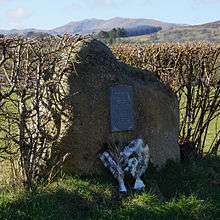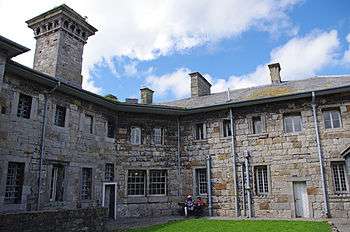Frongoch internment camp
Frongoch internment camp at Frongoch in Merionethshire, Wales was a makeshift place of imprisonment during the First World War and the 1916 Rising.

History
Until 1916 the camp housed German prisoners of war in an abandoned distillery and crude huts, but in the wake of the 1916 Easter Rising in Dublin, Ireland, the German prisoners were moved and it was used as a place of internment for approximately 1,800 Irish prisoners, among them such notables as Michael Collins. They were accorded the status of prisoners of war. Among the prisoners were the future Hollywood actor Arthur Shields[1] and sportsman and referee Thomas Burke. It is a common misconception that Éamon de Valera was also imprisoned at Frongoch.[2][3]
The camp became a fertile seeding ground for the spreading of the revolutionary gospel of the Irish rebels, with inspired organisers such as Michael Collins giving impromptu lessons in guerrilla tactics. Later the camp became known as ollscoil na réabhlóide, the "University of Revolution".[4]
Lord Decies was appointed as Chief Press Censor for Ireland after the Rising in 1916, and he warned the press to be careful about what they published. William O'Brien's Cork Free Press was one of the first papers he suppressed under the Defence of the Realm Act 1914 (DORA regulations) after its republican editor, Frank Gallagher, accused the British authorities of lying about the conditions and situation of republican prisoners at the camp.[5]
The camp was emptied in December 1916 when David Lloyd George replaced H. H. Asquith as Prime Minister. The local school Ysgol Bro Tryweryn now stands on the site of the former camp but a commemorative plaque stands nearby, with inscriptions in Irish, Welsh and English.
In 2016, the hundredth anniversary of the internment of Irish prisoners at Frongoch, the local community organized a number of commemoration events and the history of the camp was widely reported.[6][7]
List of Internees involved in the Easter Rising
This list is not complete.[8]
William Halpin[9]
- Richard Aungier
- Denny Barry[10]
- Joseph Beggs
- Gerald Boland[10]
- Michael Brady[11]
- Patrick Brogan
- Daniel Brophy
- Batt Burke
- Thomas Burke
- Pat Caddell
- Michael Carolan
- Joe Clarke
- Con Collins
- Michael Collins
- James Connor
- W. T. Cosgrave
- Philip Cosgrave
- Paddy Daly[10]
- P. T. Daly
- Matthias Derham
- John Devine
- Henry Dixon[10]
- Peter Doyle
- Thomas J Doyle
- William Doyle
- Thomas Duff
- Thomas P. Duke
- Patrick J. Early
- Dick Fitzgerald[10]
- William Ganly
- Peter Gibbons
- James Gough
- Thomas Hand[12]
- Arthur Hannon
Thomas Halpin
- John Hynes
- Dick Kelly
- J. Kelly
- Joseph P. Kelly
- Matt Kelly
- Thomas Kelly
- Edward Lawless
- Joseph Lawless
- Bernard McAllister
- John McCann
- John MacDonagh[10]
- James McDonnell
- Tom McEllistrim[10]
- Seán McGarry
- Dick McKee[10]
- Seán McLoughlin
- Seán Mac Mahon
- J. J. McNally
- Joseph McGuinness
- Thomas Maxwell
- Christopher Moran
- Patrick Moran[10]
- Peter Moran
- Christopher Mullen
- Richard Mulcahy
- Fred Murphy
- James Nowlan
- Christopher Nugent
- Seán Nunan[10]
- J. J. O'Connell
- James O'Brien
- James O'Connell
- Batt O'Connor[10]
- Joseph O'Connor[10]
- Joseph O'Doherty
- Sean O'Hanlon
- Brian O'Higgins
- Patrick O'Keeffe[10]
- Peter O'Kelly
- Seán O'Mahony
- Cathal Ó Murchadha[10]
- Thomas O'Reilly
- Liam Ó Rinn
- Gearóid O'Sullivan
- Kit Poole
- John Rafferty
- James Rickard
- Séamus Robinson
- Edward Rooney
- James Rooney
- James Ryan[10]
- P. J. Ryan
- Thomas Seaver
- Martin Shannon
- Patrick Sherwin
- Arthur Shields[10]
- Edward Stafford
- Michael Staines[10]
- Christopher Taylor
- J. Taylor
- Thomas Taylor
- Joseph Thornton
- Thomas Traynor[10]
- Joseph Vize
- Bartle Weston
- Charles Weston
- Thomas Weston
Bibliography
- Brennan-Whitmore, W, With the Irish in Frongoch (Dublin 1918)
- Ebenezer, Lyn, Fron-Goch and the birth of the IRA (London 2006)
- O'Mahony, Sean (1987). Frongoch: University of Revolution. Dublin: FDR Teoranta.
Notes
- Boylan, Henry (1999). A Dictionary of Irish Biography. Dublin: Gill and Macmillan. ISBN 0-7171-2945-4.
- "Frongoch: Whisky Makers and Prisoners of War". www.ballinagree.freeservers.com.
- During this time de Valera was held at Dartmoor, Maidstone and Lewes prisons.
- Granville, David (4 October 2002). "Plaque marks Frongoch internment camp". Irish Democrat.
- Peter Martin Censorship in the two Irelands 1922-39, Introduction p.9, Irish Academic Press (2008) ISBN 0-7165-2829-0
- "Marking 100 years - Frongoch, Wales - a unique place in Irish history". www.easter-rising-frongoch.wales.
- Kennedy, Maev (27 December 2015). "Welsh village summons ghosts of Ireland's revolutionary past". The Guardian.
- "Fingal fighters were held in Welsh prison camp". Irish Independent. April 12, 2006.
- "Military Service Pension Collection | Defence Forces Military Archives". mspcsearch.militaryarchives.ie. Retrieved 2019-03-20.
- "List of prisoners' names", Frongoch
- "Michael Brady". Kilmainham Gaol Museum.
- Maddock, Fergal. "Skerries honour for Irish volunteer Thomas Hand". independent.ie. Retrieved 21 January 2017.
External links
- Frongoch, Wales - a unique place in Irish history - a website in English, Welsh and Irish dedicated to the history of Frongoch camp, including a list of Irish prisoners’ names.
